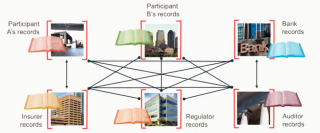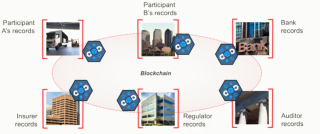Blockchain for Business #2: Blockchain role in business networks
Let's see in further details what could be the blockchain role in business networks. First of all, business never operate alone. They are always connected with other businesses, governments, banks and other kind of market organizations. There are different kind of markets and some of them could be public such as an auction, or private such as supply chain management. In any of these cases, there are tangible or intangible assets, which are transferred across the business networks.
Actual business network structure
To manage the assets flow, businesses already use ledgers. Every business has its own ledger and updates it every time a new transaction occurs. If a business transfers an asset to another business, both will update their ledgers.

We've been incrementally digitalizing this process since many years. However, it is still expensive and time consuming. At the moment every information is duplicated among the interested parties. And every audit or check will regard both the systems. It's also vulnerable to fraud, malicious modifications and cyberattacks.
Blockchain role in the business network
If we bring blockchain inside the network, we have a situation where all the business members share a common ledger. Every participant owns an identical copy of the ledger, thanks to a peer-to-peer technology which keeps it synchronized. In addition, we can use a privacy service to determine which members are able to access which information. For example, if a transaction happens among two members, they would be the only parties able to see the details. While other members will own a copy of the transaction, but won't see its details.

Achievements possible thanks to blockchain
Adding the blockchain to the business network, we are able to achieve the following four important points:
- Consensus: we determine who within the business network gets to validate or approve a transaction.
- Provenance: blockchain provides a record of who owned an asset and its complete lifecycle.
- Immutability: we use privacy services to link blocks one another. This makes it impossible to tamper with the data inside the blocks.
- Finality: this is a consequence of the previous three points. There’s only one recording system, one single truth across the network. So, it would be really easy to solve any dispute which might arise among participants.